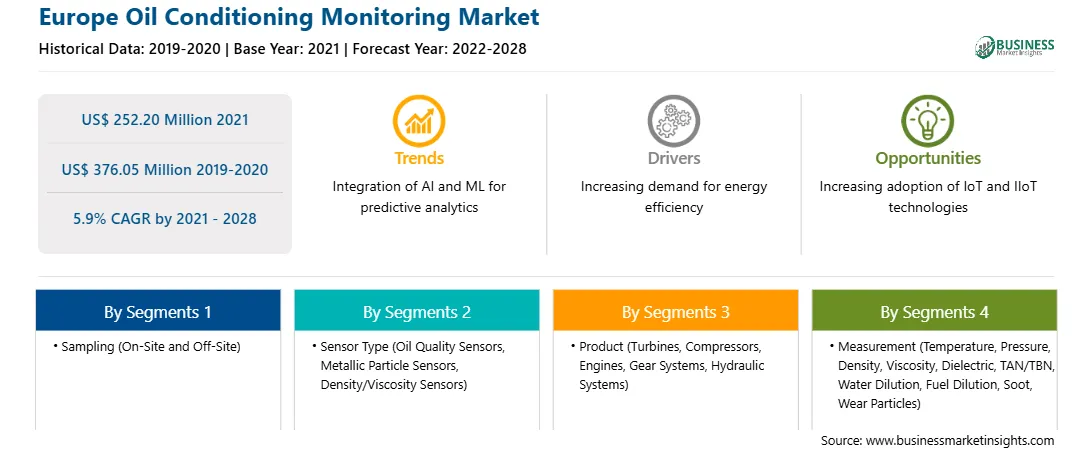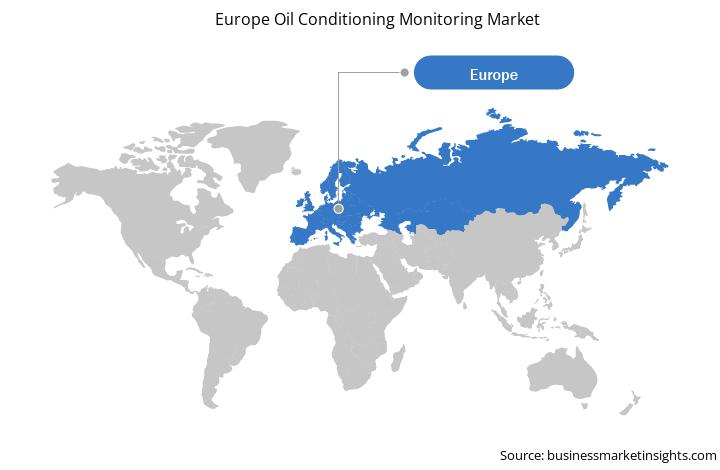Growing industrialization and surging population propel the demand for oil in Europe. Today, European population uses as much crude oil and petroleum products in a single day as it did a year a century ago because of their various benefits, such as it requires less refining and is therefore less hazardous to the environment. Moreover, owing to its availability and low cost, crude oil and petroleum are widely used in essential sectors such as transportation, medicine, agriculture, textiles, plastics, hygiene products, heating, road asphalt, and metallurgy. For instance, crude oil and petroleum accounted for 45% of total final energy consumption in Europe in 2018. More than two-third of overall oil consumption is consumed in the transportation sector (349 Mtoe pa). The demand for petroleum in road transport accounts to 49% of overall demand (250 Mtoe pa). As a result of the increasing use of oil in the region, oil conditioning monitoring equipment is in high demand. The European Union's reliance on imported crude oil is substantial and growing, since local oil supplies have fallen faster than demand. Based on the report by Cambridge Econometrics in 2018, imports accounted for 96% of the EU's oil supply. Furthermore, in recent years, the EU's exposure to supply chain security threats has grown as the source of supplies has migrated to geopolitically unstable places. For instance, Russia's proportion of crude oil imports grew from 22% in 2001 to 31% in 2018. Meanwhile, Norway's share, which is a more geopolitically stable trading partner, decreased by 54% during the same time span, says U.S. Energy Information Administration. The changing dynamics of the oil market in Europe require an efficient system to maintain a long-term oil supply chain, Which bolsters the demand for oil conditioning monitoring systems in the region
In Europe, the COVID-19 pandemic has a different impact on different countries, as only selective countries have witnessed the rise in the number of cases and subsequently attracted strict, as well as prolonged, lockdown periods or social isolation norms. However, Western European countries such as Germany, France, Russia, and the UK have seen a comparatively modest decrease in their growth activities because of their strong healthcare systems. These countries have been investing significantly to make the diagnosis and treatment of the disease more effective and less time-consuming. Despite the fact that Europe is in a state of emergency, many nations are beginning to see the light at the end of the tunnel. Traditional corporate frameworks have been swiftly replaced by more innovative business concepts. Despite the fact that everything is unlikely to return to normal very soon, the oil and gas industry is projected to rebound quickly

Strategic insights for the Europe Oil Conditioning Monitoring provides data-driven analysis of the industry landscape, including current trends, key players, and regional nuances. These insights offer actionable recommendations, enabling readers to differentiate themselves from competitors by identifying untapped segments or developing unique value propositions. Leveraging data analytics, these insights help industry players anticipate the market shifts, whether investors, manufacturers, or other stakeholders. A future-oriented perspective is essential, helping stakeholders anticipate market shifts and position themselves for long-term success in this dynamic region. Ultimately, effective strategic insights empower readers to make informed decisions that drive profitability and achieve their business objectives within the market.

| Report Attribute | Details |
|---|---|
| Market size in 2021 | US$ 252.20 Million |
| Market Size by 2028 | US$ 376.05 Million |
| Global CAGR (2021 - 2028) | 5.9% |
| Historical Data | 2019-2020 |
| Forecast period | 2022-2028 |
| Segments Covered |
By Sampling
|
| Regions and Countries Covered | Europe
|
| Market leaders and key company profiles |
The geographic scope of the Europe Oil Conditioning Monitoring refers to the specific areas in which a business operates and competes. Understanding local distinctions, such as diverse consumer preferences (e.g., demand for specific plug types or battery backup durations), varying economic conditions, and regulatory environments, is crucial for tailoring strategies to specific markets. Businesses can expand their reach by identifying underserved areas or adapting their offerings to meet local demands. A clear market focus allows for more effective resource allocation, targeted marketing campaigns, and better positioning against local competitors, ultimately driving growth in those targeted areas.

The oil conditioning monitoring market in Europe is expected to grow from US$ 252.20 million in 2021 to US$ 376.05 million by 2028; it is estimated to grow at a CAGR of 5.9% from 2021 to 2028. Adoption of big data; a lot of data Oil and gas firms are focusing on predictive analytics to reduce refining equipment downtime and maintenance costs, hence improving asset management. With rising prices and dwindling natural resources, it's more important than ever to drill where the most benefits may be reaped. Businesses are using analytics solutions to deal with such situations. Shell, for example, collects data from low-frequency seismic waves beneath the earth's surface to assist anticipate the possible amount of oil and gas resources. These waves move through the earth's crust, and depending on whether they pass through solid rock, liquids, or gaseous substances, they register differently on sensors, revealing the possible location of hydrocarbon reserves. As a result of adopting a data-driven approach, companies are focusing on big data analytics as a key change in oil conditioning monitoring systems. This is bolstering the growth of the oil conditioning monitoring market.
Based on sampling, the market is bifurcated into on-site and off-site. In 2020, the off-site segment held the largest share Europe oil conditioning monitoring market. By sensors type, the market is segmented into oil quality sensors, metallic particle sensors, and density/viscosity sensors. In 2020, the oil quality sensors segment held the largest share Europe oil conditioning monitoring market. The oil conditioning monitoring market, based on product, is segmented into turbines, compressors, engines, gear systems, and hydraulic systems. In 2020, the turbines segment held the largest share Europe oil conditioning monitoring market. By measurement, the market is segmented into temperature, pressure, density, viscosity, dielectric, TAN, TBN, water dilution, fuel dilution, soot, and wear particles. In 2020, the viscosity segment held the largest share Europe oil conditioning monitoring market. The oil conditioning monitoring market, based on industry, is segmented into transportation, industrial, oil & gas, energy & power, and mining. In 2020, the transportation segment held the largest share Europe oil conditioning monitoring market.
A few major primary and secondary sources referred to for preparing this report on the oil conditioning monitoring market in Europe are company websites, annual reports, financial reports, national government documents, and statistical database, among others. Major companies listed in the report are CM Technologies GmbH
The Europe Oil Conditioning Monitoring Market is valued at US$ 252.20 Million in 2021, it is projected to reach US$ 376.05 Million by 2028.
As per our report Europe Oil Conditioning Monitoring Market, the market size is valued at US$ 252.20 Million in 2021, projecting it to reach US$ 376.05 Million by 2028. This translates to a CAGR of approximately 5.9% during the forecast period.
The Europe Oil Conditioning Monitoring Market report typically cover these key segments-
The historic period, base year, and forecast period can vary slightly depending on the specific market research report. However, for the Europe Oil Conditioning Monitoring Market report:
The Europe Oil Conditioning Monitoring Market is populated by several key players, each contributing to its growth and innovation. Some of the major players include:
The Europe Oil Conditioning Monitoring Market report is valuable for diverse stakeholders, including:
Essentially, anyone involved in or considering involvement in the Europe Oil Conditioning Monitoring Market value chain can benefit from the information contained in a comprehensive market report.